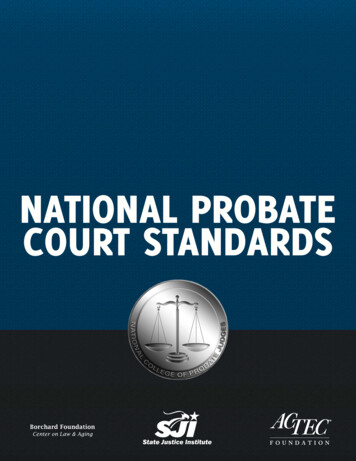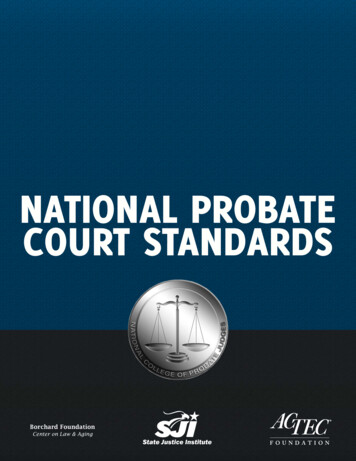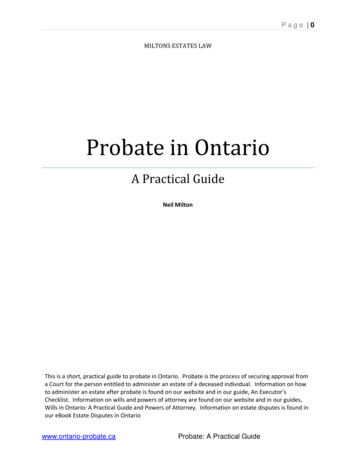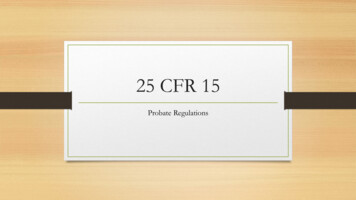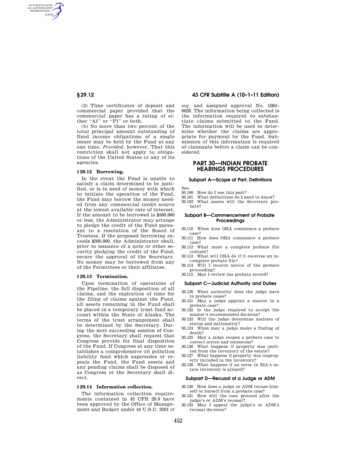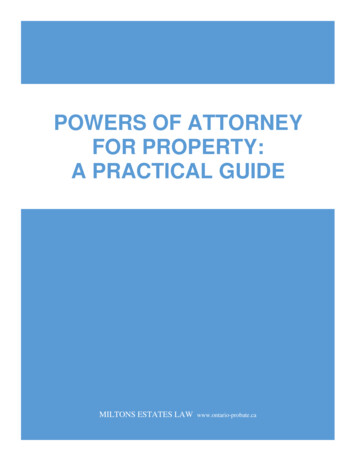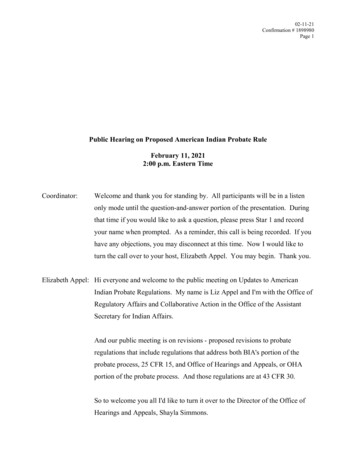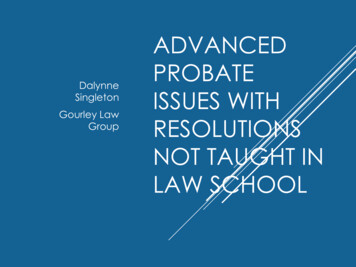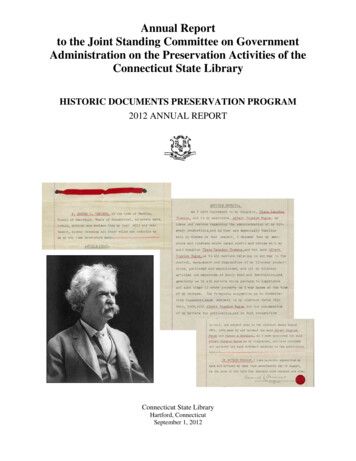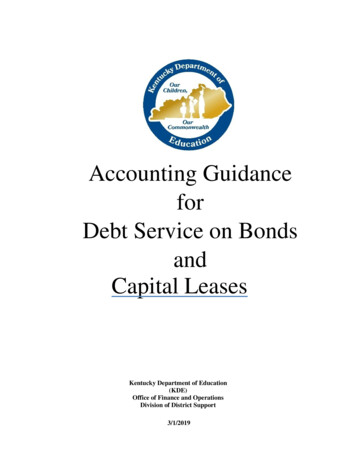
Transcription
ATTORNEY’S FEES IN PROBATEM. KEITH BRANYONJackson Walker L.L.P.777 Main Street, Suite 2100Fort Worth, Texas 76102817-334-7235State Bar of Texas37 ANNUAL ADVANCED ESTATEPLANNING AND PROBATE COURSEJune 26-28, 2013HoustonthCHAPTER 26 2013 M. KEITH BRANYON
M. KEITH BRANYONJackson Walker L.L.P.777 Main Street, Suite 2100Fort Worth, Texas 76102Telephone: 817.334.7235Telecopier: 817.870.5135BIOGRAPHICAL INFORMATIONEDUCATIONB.B.A. in Accounting, Baylor University (1981)J.D., Baylor University School of Law (1983)PROFESSIONAL ACTIVITIESPartner, Jackson Walker L.L.P., Fort Worth, TexasBoard Certified in Tax Law (1990) and in Estate Planning and Probate Law (1988),Texas Board of Legal SpecializationAdvisory Commission for Estate Planning and Probate Law,Texas Board of Legal Specialization (Member: 2000 - 2005; Chair: 2002 - 2005)Advisory Commission for Tax Law,Texas Board of Legal Specialization(Member: 2005 -2009; Vice-Chair: 2006; Chair: 2007-2009)Tax Law Exam Writing CommissionTexas Board of Legal Specialization(Member: 2005-2009; Chair: 2006-2009)Certified Public AccountantTexas Society of Certified Public AccountantsFellow – American College of Trust & Estate CounselPUBLISHED WORKSAuthor: Texas Probate – Forms and Procedures, James Publishing, 2008.LAW-RELATED SPEAKING ENGAGEMENTS AND PUBLICATIONSNumerous articles and speeches on estate planning and probate topics for the State Bar of Texas andother organizations
Attorney's Fees in ProbateChapter 26TABLE OF CONTENTSI.Fees allowed in Texas – statute or contract. 1II.Probate cases . 2A. Creditors . 2B.Will contests . 3C.Other Estates Code Sections Awarding Attorney’s Fees . 5D. Trust disputes . 6III. Declaratory Judgments Act . 6IV. Duty to Segregate . 7A. Texas law prior to 2006 . 7B.The Chapa decision . 8C.Cases which have applied Chapa . 9D. Cases which have not applied Chapa . 9V. Testimony and Proof . 10A. “Reasonable and Necessary” . 11B.Lodestar . 12C.Oral testimony . 12D. Necessary documents . 13E.Paralegal fees. 14VI. Conclusion. 15i
Attorney's Fees in ProbateChapter 26TABLE OF AUTHORITIESPage(s)FEDERAL CASESIn re Pan Am. General Hosp., LLC,385 B.R. 855 (W.D. Tex. 2008) . 12TEXAS CASESAlldridge v. Spell,774 S.W.2d 707 (Tex. App.-Texarkana 1989, no writ) . 3Approach Resource I., L.P. v. Clayton,360 S.W.3d 632 (Tex. App. – El Paso 2012, no pet.). 9, 10Arthur Andersen & Co. v. Perry Equip. Corp.,945 S.W.2d 812 (Tex. 1997) . 11, 12, 13Bair Chase Prop. Co. LLC v. S & K Development Co., Inc.,260 S.W.3d 133 (Tex. App. – Austin 2008, pet. denied) . 9Barber v. Cangelosi,2010 Tex. App. LEXIS 247 (Tex. App. – Houston [1st Dist.] January 14, 2010, no pet.) . 5Barrett v. Parchman,675 S.W.2d 289 (Tex. App. – Dallas 1984, no writ) . 12Bates v. Randall County,297 S.W.3d 828 (Tex. App. – Amarillo 2009, pet. denied). 13Dilston House Condo. Ass’n v. White,230 S.W.3d 714 (Tex. App. – Houston [14th Dist.] 2005, no pet.) . 11Dunn v. Southern Farm Bureau Cas. Ins. Co.,991 S.W.2d 467 (Tex. App. – Tyler 1999, pet. denied) . 13El Apple I, Ltd. v. Olivas,370 S.W.3d 757 (Tex. 2012) . 12, 13, 14, 15Garcia v. Gomez,319 S.W.3d 638 (Tex. 2010) . 12Gill Savings Ass’n. v. Int’l Supply Co., Inc.,759 S.W.2d 697 (Tex. App. – Dallas 1988, writ denied) . 15Goodyear Dunlop Tires N. Am. Ltd. v. Gamez,151 S.W.3d 574 (Tex. App. – San Antonio 2004, no pet.). 12Green Int’l, Inc. v. Solis,951 S.W.2d 384 (Tex. 1997) . 9Greer v. Jenkins,2004 Tex. App. LEXIS 2409 (Tex. App. – Dallas March 17, 2004, no pet.) . 5ii
Attorney's Fees in ProbateChapter 26Hope v. Baumgartner,111 S.W.3d 775 (Tex. App. – Fort Worth 2003, no pet.) . 4In the Interest of B.N.L.-B.,375 S.W.3d 557 (Tex. App. – Dallas 2012, no pet.) . 9In re Estate of Johnson,340 S.W.3d 769 (Tex. App. – San Antonio 2011, pet. dismissed) . 5, 10In the Estate of Vrana,335 S.W.3d 322 (Tex. App. – San Antonio 2010, pet. denied) . 10Lindley v. McKnight, et al.,349 S.W.3d 113 (Tex. App. – Fort Worth 2011, no pet.) . 10MBM Financial Corporation, et al. v. The Woodlands Operating Company, LP,292 S.W.3d 660 (Tex. 2009) . 1, 7Morgan Bldgs. & Spas, Inc. v. Humane Soc’y of Southeast Tex.,249 S.W.3d 480 (Tex. App. – Beaumont 2008, no pet.) . 9Sandles v. Howerton,163 S.W.3d 829 (Tex. App. – Dallas 2005, no pet.) . 11Schindler v. Schindler,119 S.W.3d 923 (Tex. App. – Dallas 2003, pet. denied) . 3Schulte v. Marik,700 S.W.2d 685 (Tex. App. – Corpus Christi 1985, writ ref’d n.r.e.) . 5State & County Mut. Fire Ins. Co. ex. rel. S. United General Agency of Tex. v. Walker,228 S.W.3d 404 (Tex. App. – Fort Worth 2007, no pet.) . 12Stewart Title Guar. Co. v. Sterling,822 S.W.2d 1 (Tex. 1991) . 8, 9Texas Commerce Bank, Nat’l Ass’n v. New,3 S.W.3d 515 (Tex. 1999) . 13Tony Gullo Motors I, L.P. v. Chapa,212 S.W.3d 299 (Tex. 2006) . 1, 8, 9, 10, 14, 15STATUTESTexas Estates Code§32.001. 2§32.005. 2§51.055. 5§113.252(a) . 4§124.018. 5iii
Attorney's Fees in ProbateChapter 26§152.051. 5§351.003. 6§351.152. 6§352.051. 1, 6§352.052. 3, 4, 5, 7, 11§355.003. 2, 6§355.102. 4§404.003(c) . 6§404.003(d) . 6§404.004(a) . 5§405.003. 6Texas Probate Code§4A . 2§4F . 2§34A . 5§113. 5§149C(c). 6§149C(d) . 6§149F . 6§154(a) . 5§233. 6§242. 1, 6§243. 3, 4, 5, 7, 11§245. 6§307. 2, 6§322. 4§322A . 5§442. 4iv
Attorney's Fees in ProbateChapter 26Texas Property Code§22.001. 7§114.064. 6Texas Business & Commerce Code§17.50(d) . 11Texas Civil Practice & Remedies Code§37.004. 7§37.005. 7§37.009. 11§38.001. 11RULESRule 1.04; Texas Rules of Professional Conduct . 11, 13v
Attorney's Fees in ProbateChapter 26that every dollar that the client owes to the attorneyATTORNEY’S FEES IN PROBATELitigating disputes in probate matters is just asmay not be recoverable in the litigation – even if thereexpensive and time-consuming as litigation in otheris a statute that allows the recovery. First, the court ortypes of cases.the jury may not award everything that is supported byHowever, because most probatelawyers do not handle contested matters in probatethe admissible evidence.courts on a regular basis, recovering attorney’s feesestate may not have sufficient funds to pay the fulland expenses can be very confusing. The statutes andjudgment. Third, even in rare cases when fees arerules which apply to attorney’s fees in probate matterscharged against the losing party, that party may beare difficult to locate and even harder to understand.judgment-proof.The purpose of this paper is to discuss various mattersdistinguish between the fees owed to the attorneythat may be litigated in probate courts and how, or if,according to the engagement letter and the amountthe litigants can recover attorney’s fees. This paperthat may be recoverable after trial or settlement.will cover matters involving decedent’s estates but notI.Second, the trust or theIn other words, the client mustFees allowed in Texas – statute or contractthose involving guardianships, although many of theIn Texas, as a general rule attorney’s fees cannotconcepts will be identical. Further, since fees incurredbe awarded to a litigant by a court unless either (1) aby a personal representative can generally be chargedstatute authorizes the award or (2) a contract betweento the Estate under Estates Code §352.051 [Probatethe Decedent and the creditor authorized the recoveryCode §242], this article will focus on the fees whichof attorney’s fees in the event of a suit broughtmay be recoverable for litigants such as beneficiariespursuant to the contract. This statement representsand creditors. The Estates Code is not effective untilwhat is known as the “American Rule” and has beenJanuary 1, 2014. Therefore, parallel cites are providedfollowed in Texas for many decades. MBM Financialto the Probate Code.Corporation, et al. v. The Woodlands OperatingThere is a cautionary note to keep in mind whenCompany, LP, 292 S.W.3d 660 (Tex. 2009), citinga cause of action allows the recovery of attorney’sTony Gullo Motors I, L.P. v. Chapa, 212 S.W.3d 299,fees. The attorney must be careful when explaining310-11 (Tex. 2006). For this reason, it is incumbentthis concept to the client.on litigants to realize that the award of attorney’s feesWhile the client may,through an engagement letter, become obligated tois not automatic.pay fees to the attorney, the client must understandattorney’s fees are being sought as a result of reliance1Pleadings must be clear that
Attorney's Fees in ProbateChapter 26upon a statute or upon a contract between the parties.creditor seeking recovery on a credit card debt or openAfter the pleadings are properly filed, the party mustaccount might also be entitled to attorney’s feesintroduce admissible evidence regarding the fees andbecause of the underlying agreement with themust secure affirmative fact findings by the court ordecedent.If the creditor already has a judgment against aby the jury.decedent prior to death, and then must attempt toII. Probate casesThe types of contested matters that can be heardcollect the judgment through the probate court, thein a probate court are vast. A Statutory Probate Courtlaw is murky. There is no specific statute in Texascan hear any type of case if it is “related to” a probatewhich allows creditors in this situation to getmatter. Estates Code §§32.001 and 32.005 [Probateattorney’s fees.Code §§4A and 4F].While the reach of Countydecedent’s death which awarded attorney’s fees wouldCourts at Law and Constitutional County Courts is nottypically have awarded “trial” fees and perhapsquite as broad, the cases can still run the gamut. Some“appellate” fees, but judgments seldom awardof those cases allow all parties to seek attorney’s fees.additional fees to cover the cost of collecting theIn others, only one party has a possibility ofjudgment.recovering fees while the other party does not.A judgment rendered prior to theIf a creditor has obtained a judgment against aA. CreditorsDecedent prior to death, the “evidence” to be used inNo specific Estates Code provision allows athe probate court would consist simply of thecreditor to collect attorney’s fees in addition to thejudgment. If judgment has not been rendered prior toamount in controversy.Therefore, to collectdeath, the creditor basically starts from the beginningattorney’s fees, the creditor must be either relying on aof the process to pursue the claim. The specific stepspre-death contract with the Decedent or on a non-to be taken by the creditor will depend upon whetherEstates Code statute which allows the recovery. Forthe personal representative is “independent” orexample, if the creditor has filed suit on a promissory“dependent.”note or contract signed by the decedent, the terms ofIn situations where the creditor is aware thatthe note or contract likely allow the recovery ofdeath is imminent, it might be preferable to delayattorney’s fees in the event of default. Estates Codetaking a judgment until the probate case has been§355.003 [Probate Code §307]. In similar fashion, ainitiated for one simple reason.2If a judgment is
Attorney's Fees in ProbateChapter 26rendered prior to death, it might be difficult to seekattorney’s fees and expenses – win or lose. However,additional attorney’s fees that would be incurred in thethe statute states that the court may (not shall) awardprobate proceeding. On the other hand, if judgmentthe fees. Thus, even with a “good faith” finding, thehas not been rendered prior to death, the creditorbeneficiary-litigant may not recover his fees andshould be able to seek all attorney’s fees, whetherexpenses.As with subsection (a), the litigant must be foundincurred before or after death, as part of what theto have brought or defended the action “in good faithauthorizing statute or contract allows.B.and with just cause.” Nothing in §352.052 or in theWill contestsIn many Will contest cases, a litigant can recovercases which have interpreted it explains whyattorney’s fees even in a losing effort. However, thesubsection (a) is mandatory while subsection (b) isability to recover fees is limited. Section 352.052 ofdiscretionary. Alldridge makes it clear that the partythe Estates Code [Probate Code §243] governswho wants attorney’s fees must have pleadingsattorney’s fees in a Will contest case. Only in twosupporting “good faith and just cause” and mustinstances can a litigant recover those fees.First,submit a question to the jury. Id. at 711. If the trial is§352.052(a) states that a person designated asto the bench, “good faith and just cause” should beexecutor in a Will or in an alleged Will can prosecutepart of the proposed findings of fact and conclusionsa proceeding to have the Will admitted to probate andof law.can be awarded attorney’s fees and expenses – win orattorney’s fees but only if those fees are found to belose. In fact, the statute states that a court shall make“reasonable.”the award if there is a fact finding that the executor orwhether fees are reasonable will be discussed later indesignated-executor brought or defended the actionthis paper.Also, §352.052 allows the recovery ofThe evidence necessary to prove“in good faith and with just cause.” Alldridge v. Spell,Fees and expenses awarded under §352.052 are774 S.W.2d 707 (Tex. App.-Texarkana 1989, no writ).payable by the Estate and not by the litigants.Section 352.052(b) puts a slight twist on theSchindler v. Schindler, 119 S.W.3d 923, (Tex. App. –situation when the litigant is merely the beneficiaryDallas 2003, pet. denied). Schindler holds that thereunder a Will or under an alleged Will. Such a person,is no support for a court assessing the attorney’s feesif seeking to probate a Will or defend a Willagainst the losing party under this statute. Since thepreviously admitted to probate, can also recover3
Attorney's Fees in ProbateChapter 26fees are payable by the Estate, the following issuesPrior to September 1, 2003, the award ofshould be examined carefully before a contest is filed.attorney’s fees and expenses in a Will contest underA beneficiary who wins the case may not§352.052 [Probate Code §243] were not considered ascare about attorney’s fees if he is set to receive the“expenses of administration” and were not classifiedentire estate anyway. In this scenario, an award ofas a “Class 2” claim. Instead, such an award was afees would be akin to the beneficiary paying himself.Class 8 claim. Hope v. Baumgartner, 111 S.W.3d 775i.ii.(Tex. App. – Fort Worth 2003, no pet.).A beneficiary of only a portion of the estateOnshould consider at the outset that the attorney’s fees toSeptember 1, 2003, the emphasized language belowbe incurred in the battle might exceed the inheritance.was added to Probate Code §322 [Estates Code§355.102]:iii. A designated-executor who loses the case,Class 2. Expenses of administration andexpenses incurred in the preservation,safekeeping, and management of the estate,including fees and expenses awardedunder Section 243 [Estates Code §352.052]of this code .and who is not also a beneficiary, faces the dauntingtask of paying out-of-pocket to litigate the disputeunless there is a finding of “good faith and just cause.”Similarly, a previously-appointed executor, who is notThus, contrary to the holding in Hope, litigants in aalso a beneficiary, who later loses a contest to aWill contest who qualify for an award of attorney’spreviously-admitted Will might be personally liablefees under §352.052 will have priority for paymentfor fees and expenses without the “good faith and justfrom estate assets over all debts except funeralcause” finding.expenses and the expenses of last illness up toIf the only probate assets are exempt from 15,000.00 (Class 1).creditor’s claims – such as a house, car and personalSectionproperty – there is no “estate” out of which to pay[ProbateCode§243]isconfusing in one other way. In both subsections (a)attorney’s fees to a litigant who does not inherit thoseexempt assets.352.052and (b), the following language is repeated:Estates Code §113.252(a) [Probate(a) A person designated as executor in a willor an alleged will, or as administrator withthe will or alleged will annexed .Code §442] allows creditors to collect debts fromnontestamentary accounts if the estate is otherwise(b) A person designated as a devisee in orbeneficiary of a will or an alleged will, or asadministrator with the will or alleged willannexed .insufficient, but the section specifically applies to“debts, taxes and expenses of administration.”[Emphasis added.]4
Attorney's Fees in ProbateChapter 26By definition, an administrator “with willHouston [1st] January 14, 2010, no pet.). Greer v.annexed” is a personal representative who was notJenkins, 2004 Tex. App. LEXIS 2409 (Tex. App. –named in the Will.Estates Code §404.004(a).Dallas March 17, 2004, no pet.). At least one court[Probate Code §154(a).] Section 352.052 gives nohas held that a person named as an alternate executorinterpretation of the emphasized phrases, and nowho was not appointed as a result of the contest wasTexas case has interpreted them. Perhaps the meaningnot entitled to recover fees and expenses. Schulte v.is that a group of designated executors, or a group ofMarik, 700 S.W.2d 685 (Tex. App. – Corpus Christinamed beneficiaries, selects a “straw man” to1985, writ ref’d n.r.e.).Also,prosecute the suit for them on the promise that thegrandchildrenwhowerenotdirect“straw man” will be appointed as “administrator withbeneficiaries under a Will but who were beneficiarieswill annexed” if the preferred Will is admitted toof testamentary trusts have been held to be entitled toprobate. However, to have a chance at recoveringan award of their fees and expenses under Probateattorney’s fees, anyone designated as an executor inCode §243 [Estates Code §352.052]. In re Estate ofan offered Will would not need to complicate thingsJohnson, 340 S.W.3d 769 (Tex. App. – San Antonioby dealing with the “administrator with will annexed”2011, pet. dismissed).language.On the other hand, beneficiaries of aC. Other Estates Code Sections AwardingAttorney’s Feescompeting Will that is offered for probate might selecti.such a straw man, but there is no logical reason for- Fees to be awarded to an attorney ad litem aredoing so since the beneficiaries are eligible to s Code §51.055 [Probate Code §34A]considered court costs after being set by the court.asii.beneficiaries.Estates Code §124.018 [Probate Code§322A] – If a dispute arises as to the apportionment ofSection 352.052, by omission, makes it cl
Litigating disputes in probate matters is just as expensive and time-consuming as litigation in other types of cases. ecause However, bmost probate lawyers do not handle contested matters in probate courts on a regular basis, attorney's fees recovering and expenses can be very confusing. The statutes and

